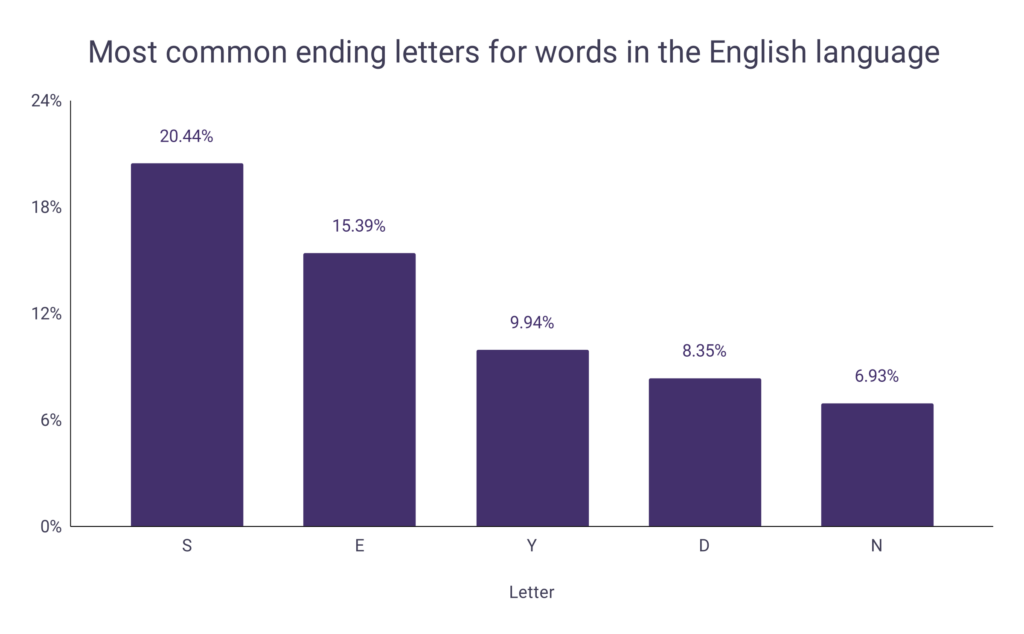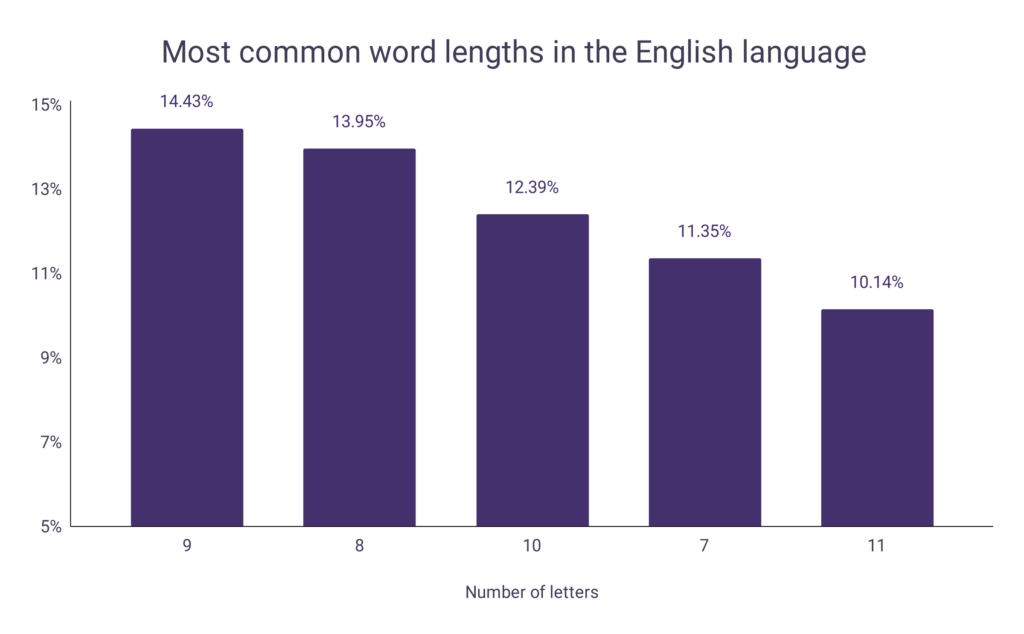Determining how many words exist in the English language is not definitive, as each dictionary includes or excludes different words. However, a core lexicon of words accounts for a grand proportion of what is used in reading, writing and listening on a day-to-day basis. Importantly, a person’s education, interests and profession will have a significant impact on their overall vocabulary.
- Many estimates suggest that the English language is made up of over 1 million words.
- This high figure also accounts for multiple forms of the same word, alongside words that are not used in modern English.
- A 2010 research project between Harvard and Google also arrived at this figure, also predicting that the language would grow by several thousands of words each year.
- However, the Oxford English dictionary (2nd Edition) defines approximately 600,000 word forms.
- Of these, it defines 171,476 words as being currently of use (alongside modern examples of their usage).
- The remaining words include many outdated words that are no longer in common use.
- Each year, the dictionary is modified in order to remove words, account for new words or change meanings for words that already exist.
- The average American’s vocabulary (39 years old) stands at 29,851 words.
- This means that their vocabulary makes up 17.41% of the total English language words currently in use.
- Incredibly, one study found that knowing just 1.75% of currently used words can allow learners to understand 95% of the words they read.
If you are looking for a comprehensive list of English words to use in your favorite word game, check out the WordsRated Word Finder! Just enter the letters available to you, select some advanced settings and hit “search” to find a ready list of solutions.
How many words in the English language are actually used?
- 95% of everyday texts and speech are covered by the top 3,000 most common words.
- Reducing this down to the top 1,000 words still covers 89% of text and speech.
- Interestingly, 33% of text and speech is covered by just the top 25 words.
Top 10 most common words in English
| Rank* | Word | Word Length | Word type |
| #1 | The | 3 | Article |
| #2 | Be | 2 | Verb |
| #3 | To | 2 | Preposition |
| #4 | Of | 2 | Preposition |
| #5 | And | 3 | Coordinator |
| #6 | A | 1 | Article |
| #7 | In | 2 | Preposition |
| #8 | That | 4 | Subordinator, Determiner |
| #9 | Have | 4 | Verb |
| #10 | I | 1 | Pronoun |
Starting letters in the English language
- In an analysis of 370,105 English language words, the most common starting letter for a word in the English language is “S”.
- The letter “S” starts 10.47% of words in the English language.
- This is followed by the letter “P” (9.42%) and the letter “C” (8.68%).
| Starting letter | Count | Percentage |
| A | 25,417 | 6.87% |
| B | 18,413 | 4.98% |
| C | 32,107 | 8.68% |
| D | 18,733 | 5.06% |
| E | 14,197 | 3.84% |
| F | 11,893 | 3.21% |
| G | 10,953 | 2.96% |
| H | 13,743 | 3.71% |
| I | 13,199 | 3.57% |
| J | 2,840 | 0.77% |
| K | 3,952 | 1.07% |
| L | 10,002 | 2.70% |
| M | 19,805 | 5.35% |
| N | 13,459 | 3.64% |
| O | 12,681 | 3.43% |
| P | 34,860 | 9.42% |
| Q | 1,793 | 0.48% |
| R | 16,783 | 4.53% |
| S | 38,764 | 10.47% |
| T | 18,819 | 5.08% |
| U | 22,767 | 6.15% |
| V | 5,329 | 1.44% |
| W | 6,559 | 1.77% |
| X | 507 | 0.14% |
| Y | 1,143 | 0.31% |
| Z | 1,387 | 0.37% |
A graph is given below to show the most common starting letters for words in the English language:

Ending letters in the English language
- The most common ending letter for a word in the English language is “S”.
- The letter “S” ends 20.44% of words in the English language.
- This is followed by the letter “E” (15.39%) and the letter “Y” (9.94%).
| Ending letter | Count | Percentage |
| A | 16,373 | 4.42% |
| B | 638 | 0.17% |
| C | 13,690 | 3.70% |
| D | 30,894 | 8.35% |
| E | 56,959 | 15.39% |
| F | 1,172 | 0.32% |
| G | 19,493 | 5.27% |
| H | 6,069 | 1.64% |
| I | 3,372 | 0.91% |
| J | 30 | 0.01% |
| K | 3,535 | 0.96% |
| L | 18,323 | 4.95% |
| M | 10,399 | 2.81% |
| N | 25,638 | 6.93% |
| O | 3,577 | 0.97% |
| P | 2,737 | 0.74% |
| Q | 30 | 0.01% |
| R | 20,768 | 5.61% |
| S | 75,666 | 20.44% |
| T | 20,779 | 5.61% |
| U | 812 | 0.22% |
| V | 141 | 0.04% |
| W | 953 | 0.26% |
| X | 1,027 | 0.28% |
| Y | 36,778 | 9.94% |
| Z | 252 | 0.07% |
A graph is given below to show the most common ending letters for words in the English language:

Word length in the English language
- Words containing 9-letters are the most common in the English Language.
- 9-letter words make up 14.43% of words in the English language.
- This is followed by 8-letter words (13.95%) and 10-letter words (12.39%).
| Word length | Count | Percentage |
| 1 | 26 | 0.01% |
| 2 | 427 | 0.12% |
| 3 | 2,130 | 0.58% |
| 4 | 7,186 | 1.94% |
| 5 | 15,920 | 4.30% |
| 6 | 29,874 | 8.07% |
| 7 | 41,998 | 11.35% |
| 8 | 51,627 | 13.95% |
| 9 | 53,402 | 14.43% |
| 10 | 45,872 | 12.39% |
| 11 | 37,539 | 10.14% |
| 12 | 29,125 | 7.87% |
| 13 | 20,944 | 5.66% |
| 14 | 14,149 | 3.82% |
| 15 | 8,846 | 2.39% |
| 16 | 5,182 | 1.40% |
| 17 | 2,967 | 0.80% |
| 18 | 1,471 | 0.40% |
| 19 | 760 | 0.21% |
| 20 | 359 | 0.10% |
| 21 | 168 | 0.05% |
| 22 | 74 | 0.02% |
| 23 | 31 | 0.01% |
| 24 | 12 | 0.00% |
| 25 | 8 | 0.00% |
| 26 | 0 | 0.00% |
| 27 | 3 | 0.00% |
| 28 | 2 | 0.00% |
| 29 | 2 | 0.00% |
| 30 | 0 | 0.00% |
| 31 | 1 | 0.00% |
A graph is given below to show the most common word lengths in the English language:

English language word origin
- It can be estimated that around 60% of words in the English language are derived from Latin.
- Around half of these are directly from Latin.
- Approximately 10% of these come from Latin through French.
- 20% – 25% of English words are Anglo-Saxon in origin.
- 15% – 20% of English words are Greek in origin.
- However, different studies have come up with greatly varied estimates.
- Overall, the English language is known to borrow words from many different languages.
How many English words have silent letters?
- The English language is well-known for using silent letters in its words.
- It is estimated that around 60% of words in the English language contain silent letters.
- However, originally, many of these letters were actually pronounced.
- The Great Vowel Shift affected the English language during the Middle Ages, changing the pronunciation of long vowels.
- Additionally, when writing, many people would add additional letters for different reasons (for example: giving the words the appearance of those from other languages).
- Over several centuries, this led to words being pronounced similarly or equally to how they are in modern times, despite little to no changes in their spelling.

